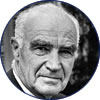Henry Luce
1898–1967 B.A. 1920
|

|
After the 1952 presidential campaign, in which Time magazine was blamed for attacking Adlai Stevenson and glorifying Dwight Eisenhower, publisher and editor Henry Luce replied unapologetically: “Stevenson was not right for the country.therefore it was Time’s duty to explain why the country needed Ike. Any other form of objectivity would have been unfair and uninvolved.”
The response defined the Luce brand of journalism, which sought to persuade at least as much as to inform. Biographers trace the crusading zealand Luce’s religious, nationalist, conservative viewsto his upbringing as the son of a missionary in China. Journalists complained that he totally rewrote dispatches from China in the 1940s to promote Nationalist leader Chiang Kai-shek.
Luce had sure business instincts. His magazine empire included Time (founded in 1923 with his Yale classmate Briton Hadden), Fortune (1930), Life (1936), and Sports Illustrated (1954), each of which discovered and exploited a vast market. Long before the advent of television, Luce discovered the value of news as a form of entertainment. In its early years Time simply picked up and rewrote stories from the daily press. Its idiosyncratic style, incorporating a clear narrative sequence, visual descriptions of individuals, and quirky word play, inspired countless imitators around the world.

